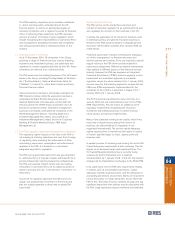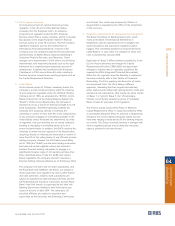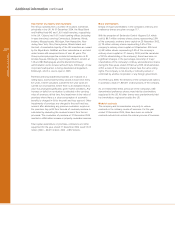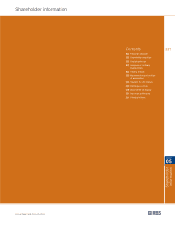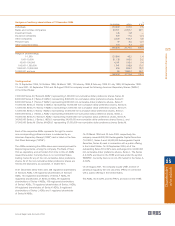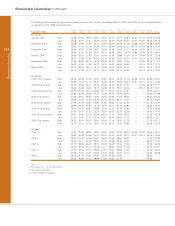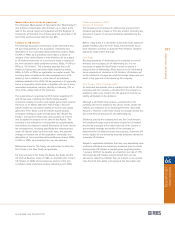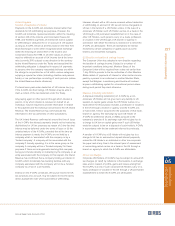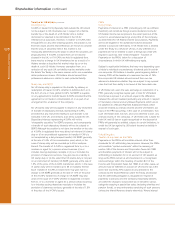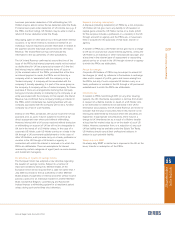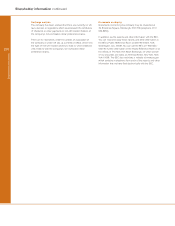RBS 2004 Annual Report Download - page 228
Download and view the complete annual report
Please find page 228 of the 2004 RBS annual report below. You can navigate through the pages in the report by either clicking on the pages listed below, or by using the keyword search tool below to find specific information within the annual report.
226
Shareholder information
Taxation for US Holders (continued)
Taxation of capital gains
A US Holder that is not resident (or, in the case of an
individual, ordinarily resident) in the UK will not normally be
liable for UK tax on capital gains realised on the disposition of
such holder’s non-cumulative dollar preference share or ADS
unless at the time of the disposal, in the case of a corporate
US Holder, such US Holder carries on a trade in the UK
through a permanent establishment or, in the case of any other
US Holder, such US Holder carries on a trade, profession or
vocation in the UK through a UK branch or agency and such
non-cumulative dollar preference share or ADS is or has been
used, held or acquired by or for the purposes of such trade (or
profession or vocation), permanent establishment, branch or
agency. Special rules apply to individuals who are temporarily
not resident or ordinarily resident in the UK.
A US Holder will, upon the sale, exchange or redemption of a
non-cumulative dollar preference share or ADS generally
recognise capital gain or loss for US federal income tax
purposes (assuming in the case of a redemption, that such US
Holder does not own, and is not deemed to own, any ordinary
shares of the company) in an amount equal to the difference
between the amount realised (excluding in the case of a
redemption any amount treated as a dividend for US federal
income tax purposes, which will be taxed accordingly) and the
US Holder’s tax basis in the non-cumulative dollar preference
share or ADS.
A US Holder who is liable for both UK and US tax on gain
recognised on the disposal of a non-cumulative dollar
preference share or ADS will generally be entitled, subject to
certain limitations, to credit the UK tax against its US federal
income tax liability in respect of such gain.
Estate and gift tax
A non-cumulative dollar preference share or ADS held by an
individual, whose domicile is determined to be the United
States for purposes of the Estate Tax Treaty and who is not a
national of the UK, will not be subject to UK inheritance tax on
the individual’s death or on a lifetime transfer of the non-
cumulative dollar preference share or ADS, except in certain
cases where the non-cumulative dollar preference share or
ADS (i) is comprised in a settlement (unless, at the time of the
settlement, the settlor was domiciled in the United States and
was not a national of the UK); (ii) is part of the business
property of a UK permanent establishment of an enterprise; or
(iii) pertains to a UK fixed base of an individual used for the
performance of independent personal services. The Estate Tax
Treaty generally provides a credit against US federal estate or
gift tax liability for the amount of any tax paid in the UK in a
case where the non-cumulative dollar preference share or ADS
is subject to both UK inheritance tax and US federal estate or
gift tax.
UK stamp duty and stamp duty reserve tax (“SDRT”)
The following is a summary of the UK stamp duty and SDRT
consequences of transferring an ADS in registered form
(otherwise than to the custodian on cancellation of the ADS) or
of transferring a non-cumulative dollar preference share.
A transfer of a registered ADS executed and retained in the
United States will not give rise to stamp duty and an agreement
to transfer a registered ADS will not give rise to SDRT.
Stamp duty or SDRT will normally be payable on or in respect
of transfers of non-cumulative dollar preference shares and
accordingly any holder who acquires or intends to acquire
non-cumulative dollar preference shares is advised to consult
its own tax advisers in relation to stamp duty and SDRT.
X-CAPs
United States
Because the X-CAPs have no stated maturity, can be
exchanged for preference shares or ADSs at the option of the
company, would be treated as if they were preference shares in
a winding-up of the company, and the company may elect not
to make payments on the X-CAPs, the X-CAPs will be treated
as equity for US federal income tax purposes.
Payments (including any UK withholding tax, as to which see
below) will constitute foreign source dividend income for US
federal income tax purposes to the extent paid out of the
current or accumulated earnings and profits of the company,
as determined for US federal income tax purposes. Payments
will not be eligible for the dividends-received deduction allowed
to corporate US Holders.
Subject to applicable limitations that may vary depending upon
a holder’s individual circumstances, dividends paid to certain
non-corporate US Holders in taxable years beginning before
1 January 2009 will be taxable at a maximum tax rate of 15%.
Non-corporate US Holders should consult their own tax
advisers to determine whether they are subject to any special
rules that limit their ability to be taxed at this favourable rate.
A US Holder will, upon the sale, exchange or redemption of
X-CAPs, generally recognise capital gain or loss for US federal
income tax purposes (assuming in the case of a redemption,
that such US Holder does not own, and is not deemed to own,
any ordinary shares of the company). A US Holder who is liable
for both UK and US tax on gain recognised on the disposal
of the X-CAPs will generally be entitled, subject to certain
limitations, to credit the UK tax against its US federal income
tax liability in respect of such gain.
Gain or loss will not be recognised by a US Holder upon the
exchange of X-CAPs for preference shares or ADSs pursuant
to the company’s exercise of its exchange right. A US Holder’s
basis in the preference shares or ADSs received in exchange
for its X-CAPs will be the same as the US Holder’s basis in the
X-CAPs at the time of the exchange and the US Holder’s holding
period for the preference shares or ADSs received in the exchange
will include the holding period of the X-CAPs exchanged.
Shareholder information continued



